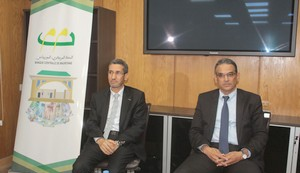Faced with information on a supposed record high debt ratio, the financial authorities of Mauritania have stepped up to the plate. On the sidelines of a joint press briefing on Monday, August 26, 2019, the Minister of Finance, Mohamed Lemine Ould Dhehby and the governor of the Central Bank of Mauritania, Abdel Aziz Ould Dahi, have rejected as a whole what they describe as “unfounded” information about the country’s macroeconomic situation. To counter fake news, the WB announces the establishment of a communication unit to respond to requests for information from the press.
At the root of the recent controversy over the supposed over-indebtedness, a BCM open market operation on the Treasury bond market, which has been interpreted by observers as signs of pressing financing needs. Indeed, the Central Bank of Mauritania (BCM) and the Mauritanian Treasury jointly launched, on Monday, a call for tenders for the transfer of treasury bills for a total amount of 660 million UMU ouguiya, or 16 million euros. euros with maturities ranging from 4 to 52 weeks.
However, such interventions that participate in monetary regulation are primarily aimed at adjusting supply and demand for money, said a familiar source of Mauritanian economic issues. “By this standard procedure, the central bank seeks to change, downward or upward, the money market rate.”
In recent transactions, the BCM sold securities, removing liquidity from the market. The effect of such an intervention is to eventually cause the rise in interest rates. This will push the BCM to inevitably return to buy the securities to reduce these rates down in this ceaseless piloting and monitoring operation which aims to maintain the main macroeconomic indicators in economic orthodoxy.
As of today, Mauritania has foreign exchange reserves of $ 1.48 billion, or 6 months of imports as against 4 months for the West African Economic and Monetary Union (WAEMU) zone, and three months for the Central African Economic and Monetary Community (CEMAC) region. In 2009, the reserves of the Islamic Republic did not exceed 240 million dollars.



